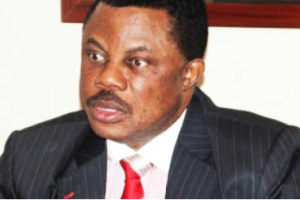Senior Correspondent, OKEY MADUFORO, assesses the administration of Anambra State Governor, Willie Obiano, one year after inauguration.
The search by former Anambra State Governor, Peter Obi, for his successor was not an easy task. Many names were thrown up as All Progressives Grand Alliance (APGA) candidate for the job. It was however narrowed to Anambra North Senatorial District, where a total of 12 aspirants jostled for the post. But at the end of APGA gubernatorial primaries, Willie Maduabuchi Obiano, who was considered a relatively unknown figure, picked the prized ticket.
Coming from the private sector and largely considered a stranger to Anambra politics, Obiano was seen by many as a greenhorn in public administration.
Today, 365 days after, the true picture of who the governor is has really manifested and in the process, altering earlier impression of the people on him.
Carving a niche for himself, however, did not come easy; it rather came with prices. Obiano was first faced with the challenges of the N75 billion which his predecessor claimed to have left in the state’s coffers.
Even before a clearer explanation would be made on the true status of the said N75 billion, insinuations were rife that the money was intact but would not be prudently managed by the governor.
Deepening Obiano’s predicament, as it were, was the conduct of local government election by his predecessor. Following the election, the departing administration had returned council funds to the 21 council areas, hence drastically cutting down funds at his disposal.
Similarly, over 6,000 workers were employed by the exiting government which indeed increased the wage bill of the state. It was, thus, not unusual that the people of Anambra became apprehensive on how the new man would pilot the affairs of the state successfully.
The governor further found himself in a more precarious situation when several road contracts were awarded and projects flagged off by the outgoing governor, some, even three hours to his inauguration on the March 16, 2014.
Faced with these obvious challenges, many had expected the new governor to cave in. But that was not to be.
He rather hit the ground running with a careful selection of his cabinet members that comprised bureaucrats that have not been so much involved in the politics of the state.
In what appeared a move in the right direction, security became the first point of call of his administration. Promptly, a joint task force on security was set up comprising the police, army, vigilance groups, State Security Service (SSS) and the Nigerian Security and Civil Defence Corps (NSCDC).
Within three months, Onitsha, the state’s commercial hub, was rid of street urchins and petty criminals. The same measure was extended to Nnewi, Awka and Ekwulobia.
Next in the agenda was the conscious efforts at sustaining the projects commenced by his predecessor. Obiano’s engagement in this direction, was quite instructive, given the allegations that he had abandoned the projects initiated by Obi.
“No project started by the former governor would be abandoned. Those projects are for Anambra people, and not for one man.
“We shall even improve on what we already have on ground and ensure that Anambra state is made the home of socio economic development in the country,” he had said.
Consequently, Obiano literally relocated his office to the project sites, putting pressure on the contractors and insisting that quality and precision were adhered to in the execution of the projects.
In similar vein, fears being nursed over the fate of civil servants in the state were allayed when salaries continued to be paid. In fact, just recently, increments were effected on the workers’ salaries. Even the alleged plot to downsize the work force never came to pass.
Even with these feats, critics of the governor still contend that he has a bloated cabinet with many special assistants, senior special assistants and special advisers, accusing some of being redundant and yet being paid for doing practically nothing. Some even call for cabinet reshuffle.
The state chairman of APGA, Mike Kwentoh, however, countered these allegations, describing them as orchestration of those who failed to make the list of cabinet members.
“Anambra needs all hands on deck to make things work. Not everybody would be commissioner or SA. Those appointed are already at work and they are doing well. Why do people want to change a winning team simply because they did not get appointments? The governor had, before these appointments, under-studied them and their credentials and found them qualified to work for the state,” he said.
The governor, on his own, has also literally turned deaf ears to the attacks, preferring to remain focused on his schedules.
The administration, for instance, seems determined to give agriculture a pride of place.
Determined to improve that sector, new access roads are currently being constructed into the food producing areas of the state. Farm settlements are also being revived to boost food production.
His efforts in this regard are, however, being misunderstood by political opponents that accuse the government of according more attention to the seven council areas of Anambra North.
Obiano’s supporters, however, fight back, citing similar infrastructure uplift in Anambra South Senatorial District – another food basket of the state. In this instance, local governments such as Aguata, Orumba North, Orumba South, Nnewi South, Ekwusigo and Ihiala are counted among those that have received fair share of the agriculture reform agenda of the governor.
According to releases from the state’s Ministry of Information Culture and Tourism: “There is no section of Anambra State that is more important than the other. If you go to Anambra South that produces palm oil, rice, cassava and other items, roads are being constructed there and farmers in those areas are being encouraged. It is not only in Anambra North alone. Anambra Central is the most developed, but we are working in that area. The governor has not abandoned any part of the state.”
What, perhaps, attest to this are the on-going projects in Awka capital territory in Anambra Central.
With the new efforts, Awka capital territory, once regarded as a glorified local government headquarters, is beginning to wear a befitting status of state capital. This is especially with the construction of three major fly-over bridges from Aroma Junction, passing through Kwata Junction and terminating at Amawbia Junction along Onitsha–Awka expressway.
According to the governor, the project is not just to give Awka an ecstatic look, but to decongest traffic along the expressway which serves commuters, heavy duty vehicle coming in and out of Onitsha, Kogi, Benue, Enugu and Imo states.
Critics of the governor accuse him of extravagance – a charge his supporters have flatly rejected. What remains uncertain is the prediction in some quarters on the imminent extinction of his political party, APGA, especially following the defection of Obi to the Peoples Democratic Party (PDP).
Those with this view allege that the last House of Assembly and National Assembly primaries of APGA in Anambra left much to be desired, stressing that loyal party members and chieftains were shortchanged in the exercise.
Some party members disagree, insisting that APGA had never had it so good, stressing that Obiano has rather injected new blood and vigour into the party’s structure.















